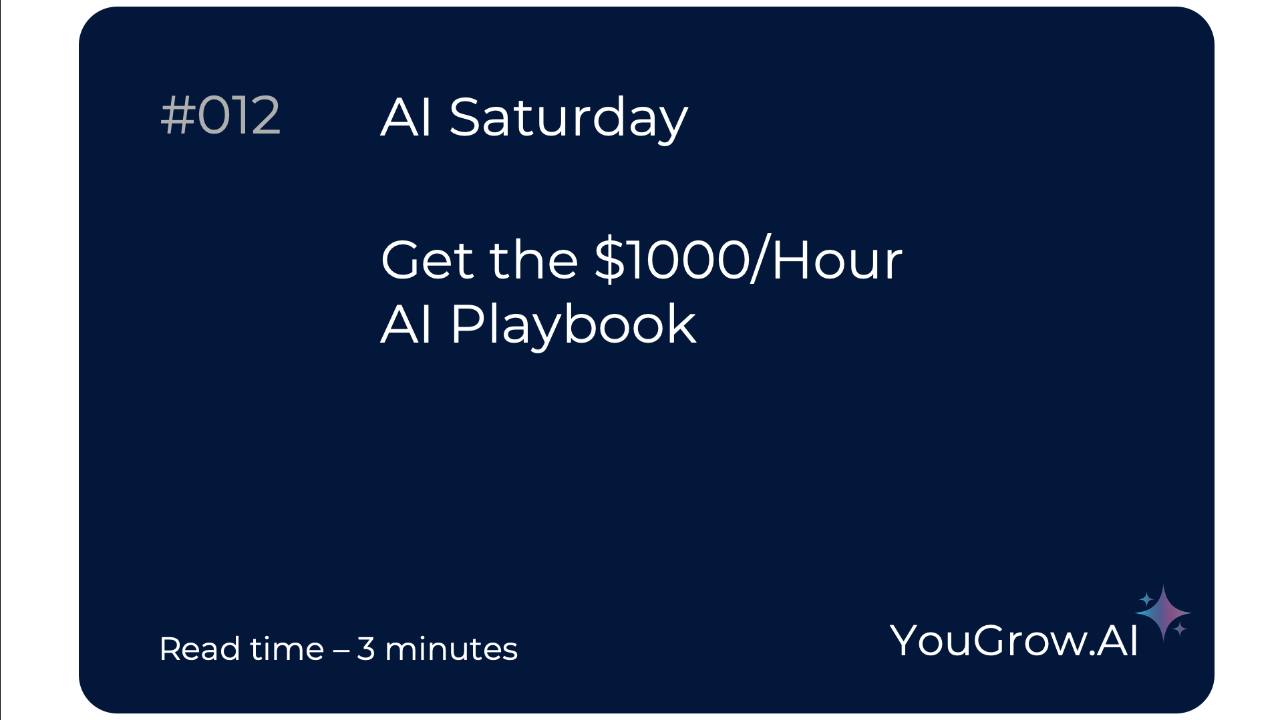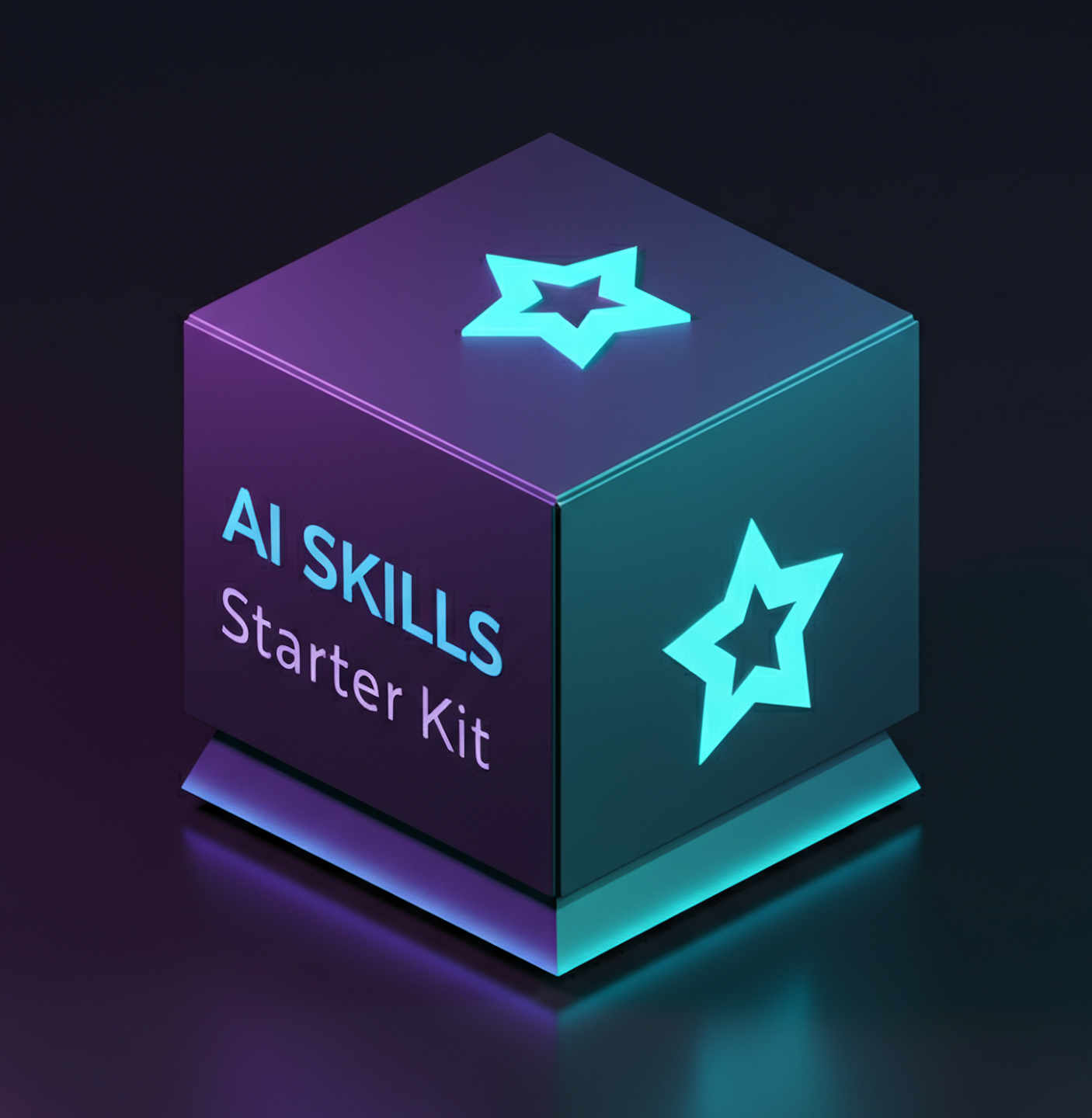Outsmarting the Giants
Leveraging AI Even When You Don't Have a Dedicated Tech Team
Let's be honest, when you hear about companies “crushing it” with AI, you probably picture tech giants with armies of data scientists and engineers, right?
As an SMB owner, you might think, “AI is amazing…for them. Not for us.”
The idea of leveraging AI can feel completely out of reach when you don't have a dedicated tech team (or even a dedicated tech person!).
But here’s the thing: that’s simply not true anymore.
In this guide, I'm going to show you how SMBs can not only adopt AI, but use it to outsmart the giants, even without in-house AI experts.
It’s about accessible AI, smart strategies, and empowering the team you already have.
Why is leveraging AI without a tech team so crucial for SMB competitiveness today?
Because the old rules of business are being rewritten by AI.
Larger companies are pouring resources into AI, gaining efficiencies, personalizing customer experiences, and innovating at an unprecedented pace.
If SMBs don’t find a way to leverage AI’s power, they risk being outmaneuvered and left behind.
But here's the empowering truth: you don’t need to replicate Google’s AI infrastructure to compete effectively.
Affordable, user-friendly AI tools are democratizing access to this transformative technology, allowing SMBs to level the playing field and gain a competitive edge, even – and especially – without a dedicated tech team.
It's about smarts, not size.
The biggest hurdle preventing SMBs from embracing AI isn't budget (though that’s a concern), and it's not even fear of the unknown (though that’s real too).
It’s the pervasive feeling of “we just don’t have the tech skills.” You might be thinking: “AI is too complex. We don’t have data scientists. We don’t have AI engineers.
It’s just too technical for us.” This “skills gap” myth is incredibly damaging.
It leads to inaction, missed opportunities, and a feeling of being perpetually behind the curve. SMBs often feel trapped, believing AI is only accessible to companies with massive tech departments, reinforcing the idea that they simply can’t compete in the AI-driven landscape.
This perceived lack of expertise becomes a self-fulfilling prophecy, preventing SMBs from even exploring the surprisingly accessible AI solutions available today.
You don't need a dedicated tech team to leverage the power of AI. You need a smart strategy and the right, accessible tools. Outsmarting the giants is about leveraging your strengths with affordable AI, not replicating their tech infrastructure.
Do this:
-
Embrace No-Code/Low-Code AI Platforms: Democratizing AI for Non-Techies: User-friendly platforms make AI accessible to anyone, regardless of coding skills.
-
Focus on User-Friendly AI Tools: Intuitive Interfaces and Plug-and-Play Solutions: Prioritize tools designed for ease of use and quick implementation, not complex technical setups.
-
Start with Simple, Specific Use Cases: Small Wins Build Momentum and Confidence: Don't try to overhaul your entire business overnight. Begin with a manageable AI project that delivers tangible results.
-
Leverage Readily Available AI Training Resources: Upskill Your Existing Team, No Need to Hire Experts: Utilize online courses, tutorials, and platform documentation to empower your current team to use AI effectively.
-
Focus on "AI-Augmented" Roles, Not "AI Expert" Roles: Empower Your Team to Work With AI, Not Become AI Specialists: Shift your mindset from needing AI experts to enabling your team to leverage AI as a tool to enhance their existing skills.
Let’s look at each in more detail.
Embrace No-Code/Low-Code AI Platforms: Democratizing AI for Non-Techies:
The rise of no-code and low-code AI platforms is a game-changer for SMBs.
These platforms eliminate the need for extensive coding knowledge, allowing anyone on your team – regardless of their technical background – to build and deploy AI-powered solutions.
Drag-and-drop interfaces, pre-built templates, and intuitive workflows make AI development accessible to everyone, truly democratizing AI and breaking down the "tech skills" barrier.
-
Actionable Advice:
-
Explore No-Code AI Automation Platforms: Platforms like Zapier, Make (formerly Integromat), and UIPath offer no-code interfaces to automate workflows with AI integrations, connecting your existing apps and streamlining processes without any coding.
-
Investigate No-Code AI Chatbot Builders: Platforms like ManyChat, Chatfuel, or Dialogflow (with simplified interfaces) allow you to build AI-powered chatbots for customer service or lead generation using visual builders, no coding required.
-
Look for No-Code AI Analytics and Reporting Tools: Platforms like Google Analytics with AI insights, or Tableau Public (free version) offer user-friendly dashboards and AI-powered features to analyze data and visualize trends without needing to write complex code or queries.
Focus on User-Friendly AI Tools: Intuitive Interfaces and Plug-and-Play Solutions:
Beyond no-code platforms, a vast ecosystem of user-friendly AI tools is emerging, specifically designed for ease of use and quick implementation.
These tools prioritize intuitive interfaces, clear documentation, and plug-and-play integrations with existing business software, minimizing the technical learning curve and allowing SMBs to start seeing results quickly.
-
Actionable Advice:
-
Prioritize User-Friendliness in AI Tool Selection: When evaluating AI tools, make user-friendliness a top priority. Look for platforms with clear interfaces, helpful tutorials, and readily available customer support, ensuring your team can adopt them without extensive training.
-
Seek Out Plug-and-Play AI Integrations: Choose AI tools that seamlessly integrate with the software you already use (CRM, email marketing, social media platforms). Easy integration minimizes setup complexity and allows you to leverage AI within your existing workflows.
-
Read User Reviews and Case Studies Focused on Ease of Use: Before committing to an AI tool, research user reviews and case studies, specifically looking for feedback from SMBs or users with limited technical backgrounds. Focus on testimonials that highlight ease of implementation and user-friendliness.
Start with Simple, Specific Use Cases: Small Wins Build Momentum and Confidence:
Don't fall into the trap of thinking you need to implement a complex, company-wide AI strategy from day one. The most effective approach for SMBs is to start small and focused.
Identify a single, specific business problem or task where AI can deliver a quick win.
Successfully implementing a simple AI use case builds momentum, demonstrates tangible value, and boosts your team's confidence to tackle more ambitious AI projects in the future.
-
Actionable Advice:
-
Brainstorm Quick-Win AI Use Cases: Identify repetitive, time-consuming tasks or simple business problems that AI could address relatively easily. Think about areas like automated email responses, basic data analysis, or content repurposing.
-
Focus on Tangible, Measurable Results: Choose a pilot AI project where you can easily track and measure the impact. Define clear metrics for success (e.g., time saved, cost reduction, improved efficiency) to demonstrate the value of your initial AI implementation.
-
Celebrate Early Wins to Build Team Enthusiasm: Once you achieve a successful initial AI implementation, highlight the positive results and celebrate the win with your team. Showcasing early successes builds buy-in and encourages further AI exploration.
Leverage Readily Available AI Training Resources: Upskill Your Existing Team, No Need to Hire Experts:
The internet is awash with readily available, often free or low-cost, resources to upskill your existing team in AI.
You don't need to hire expensive AI specialists right away.
Focus on empowering your current employees with the foundational knowledge and practical skills to use AI tools effectively within their existing roles.
-
Actionable Advice:
-
Utilize Free Online AI Courses and Tutorials: Platforms like Coursera, edX, Google AI, and fast.ai offer numerous free or affordable introductory AI courses and tutorials designed for non-technical audiences.
-
Explore Platform-Specific Training Resources: Most user-friendly AI platforms provide their own training materials, tutorials, and documentation. Leverage these resources to quickly onboard your team on the specific AI tools you choose.
-
Encourage Peer-to-Peer Learning and Knowledge Sharing: Foster a culture of internal knowledge sharing and peer support. Encourage team members to share their AI learning experiences, tips, and best practices with each other, creating a collaborative learning environment.
Focus on "AI-Augmented" Roles, Not "AI Expert" Roles: Empower Your Team to Work With AI, Not Become AI Specialists:
Shift your mindset from thinking you need to hire dedicated "AI Experts" to embracing the concept of "AI-Augmented" roles.
Your existing team members already possess valuable domain expertise and business knowledge.
The goal isn't to transform them into AI specialists, but to empower them to leverage AI as a tool to enhance their existing skills, automate mundane tasks, and make smarter, data-driven decisions within their current roles.
-
Actionable Advice:
-
Reframe Job Descriptions to Include AI Skills (Where Relevant): As you hire new employees or update existing job descriptions, consider incorporating basic AI literacy or AI tool usage as a desired skill, signaling your company's embrace of AI and attracting digitally savvy talent.
-
Provide AI Literacy Training for All Employees: Offer basic AI literacy training to all team members, regardless of their role. Focus on demystifying AI concepts, explaining its potential applications, and building a foundational understanding of how AI can impact their work.
-
Encourage Experimentation and AI Skill Development Within Existing Roles: Create opportunities for your team members to experiment with AI tools within their current roles. Encourage them to identify tasks they can automate, workflows they can improve with AI, and new ways to leverage data insights in their daily work.
Overcoming the "Skills Gap" Myth:
Remember, you don't need to become a tech company overnight to benefit from AI.
The "skills gap" is often more of a "perception gap."
Focus on understanding the concepts of AI, identifying practical use cases for your business, and leveraging user-friendly tools that empower your existing team. Start small, experiment, learn, and iterate.
You already have the core ingredient for AI success: a team of smart, capable people who understand your business. AI is just a tool to amplify their abilities, not replace them with robots.
Key Takeaways:
-
SMBs CAN leverage AI to outsmart giants, even without dedicated tech teams.
-
No-code/low-code platforms democratize AI, making it accessible to everyone.
-
User-friendly AI tools prioritize ease of use and quick implementation.
-
Start small, focus on specific use cases, and build momentum with quick wins.
-
Empower your existing team with AI skills; you don't need to hire AI experts.
-
The "skills gap" is a myth; focus on practical application and accessible tools.
Call to Action:
Ready to stop feeling limited by the "skills gap" myth and start leveraging affordable AI to outsmart the giants in your industry? Take action today!
-
Reply to this email and tell me: What's ONE area of your business where you see the biggest potential for AI to make a difference, even without a dedicated tech team? I'm here to help you brainstorm practical first steps.
-
Explore one no-code or user-friendly AI platform this week and see how accessible AI has become.
-
Share this guide with another SMB owner who feels like they're behind the curve on AI. Let's empower each other to compete smarter and thrive in the age of AI, tech team or not.
Let's build businesses that are not just keeping up, but truly leading in the AI-powered future, regardless of size or tech expertise.



